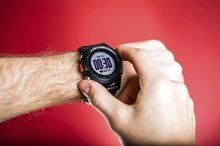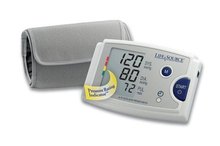Why Does My Heart Rate Monitor Give Me Erratic Readings?
Keeping track of your heart rate and exercise intensity can be beneficial for keeping your exercise regimen on track when meeting fitness goals. Heart rate monitors can be a personal clip-on monitor or a strap-on device that emulates an electrocardiogram machine. Typically, heart rate monitors detect either your pulse or electrical impulses from your heart, and then digitally display the heart rate. Certain variables can affect the accuracy of heart rate monitors.
Calibration
Your heart rate monitor's readings will be inaccurate, or jump up and down in an erratic fashion, if the calibration of the device is not set correctly. Manually setting the target heart rate zone, baseline heart rate values, body height, body weight and age, and -- if the monitor contains multiple parts -- syncing before engaging in exercise are essential to accurate readings. The monitor's sensors will react erroneously if your values are off from a proper calibration.
Electrical Interference
How Can I Tell If My Heart Rate Monitor Needs a New Battery?
Learn More
Electrical equipment generating radio or magnetic interference can affect the accuracy of many wireless chest-strap monitors, according to Dr. Vivian Heyward, the author of "Advanced Fitness Assessment and Exercise Prescription." These pieces of equipment even include exercise equipment such as other heart rate monitors, treadmills, rowing machines, ellipticals and stair climbers 1. Another type of electrical equipment that can interfere with your heart rate monitors is florescent lighting, reports the American College of Sports Medicine. There is a chance you will have erratic and spontaneously changing readings on your monitor if you stand underneath a florescent light.
- Electrical equipment generating radio or magnetic interference can affect the accuracy of many wireless chest-strap monitors, according to Dr. Vivian Heyward, the author of "Advanced Fitness Assessment and Exercise Prescription.
- " Another type of electrical equipment that can interfere with your heart rate monitors is florescent lighting, reports the American College of Sports Medicine.
Electrical Conductivity
Some monitors record electrical impulses from your heart. Many of these monitors are the type you strap around your chest. The electrical conductivity for these monitors sometimes requires you to moisten the monitor itself. Too much or too little water can cause erroneous readings, as can neglecting to dry the skin where you applied the monitor. Similarly, sweating profusely can cause sporadic readings while using an electrical monitor due to the conductivity of the salt in your sweat, according to Dr. Heyward. Also, metal wiring, such as that within bras, can cause misreadings in electrical impulse heart monitors if too close to the monitor's location.
- Some monitors record electrical impulses from your heart.
- Too much or too little water can cause erroneous readings, as can neglecting to dry the skin where you applied the monitor.
Inappropriate Placement
How to Pair a Sensor Receiver Heart Monitor With the Garmin 305
Learn More
Your sporadic readings could also be attributed to the monitor being placed on your body improperly. Many heart rate monitors attach to your fingertips, earlobes, wrists and arms. If you do not have the monitor aligned properly or -- in monitors that are body location specific -- applied to the spot it's designed to perform best at, your readings may jump. Many of these readers use infrared sensors, states the American College of Sports Medicine, which can be disrupted if clothing is in the way or the monitor is fastened tightly enough to the skin.
- Your sporadic readings could also be attributed to the monitor being placed on your body improperly.
- Many of these readers use infrared sensors, states the American College of Sports Medicine, which can be disrupted if clothing is in the way or the monitor is fastened tightly enough to the skin.
Product Condition and Sensitivity
Sometimes it comes down to the make of the product if your reader is acting sporadically. Some monitors can be extremely sensitive to any change in heat, skin moisture, heart rate change and motion during exercise. These tend to be the cheaper monitors, and you can lose quality when trading for affordability. The condition of the monitor is also integral. Having an older device with a worn out battery or beaten sensors will also affect the accuracy of the monitor.
- Sometimes it comes down to the make of the product if your reader is acting sporadically.
Related Articles
References
- "Advanced Fitness Assessment and Exercise Presciption"; Vivian H. Heyward; 2006
- "ACSM's Guidelines for Exercise Testing and Prescription, Eighth Edition"; American College of Sports Medicine; 2010
- Diet and Fitness Resources: Heart Rate Monitor Problem Solving
- Gillinov S, Etiwy M, Wang R, et al. Variable Accuracy of Wearable Heart Rate Monitors during Aerobic Exercise. Med Sci Sports Exerc. 2017;49(8):1697–1703. doi:10.1249/MSS.0000000000001284
- American Heart Association. Know Your Target Heart Rates for Exercise, Losing Weight and Health. Updated January 4, 2015.
Writer Bio
Daniel Bradley is a health, fitness, sport and nutrition expert in Philadelphia, Pa. He began writing professionally in 2007 and has contributed to the Mid-Atlantic American College of Sports Medicine Chapter's Research Panel. Bradley is a certified ACSM Health Fitness Specialist and an outdoor fitness instructor. He holds a Bachelor of Science in exercise science with a physical therapy concentration from West Chester University.







